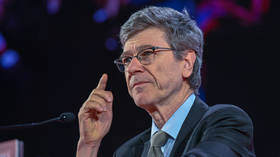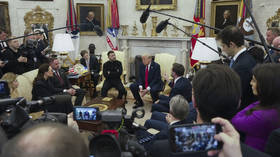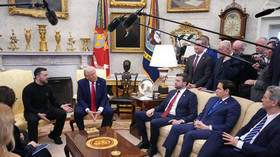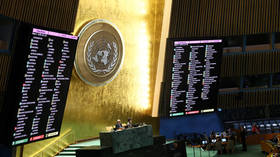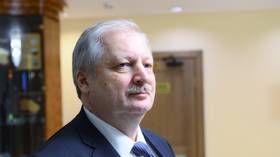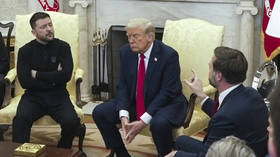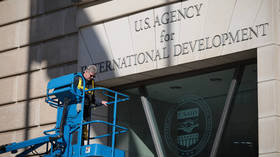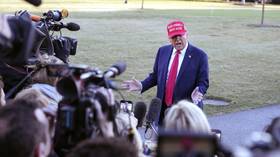Russia avoids blanket ban from Rio Olympics after IOC decision
The International Olympic Committee has left it to individual sports federations to decide if Russian teams should be allowed to participate in next month's Olympic Games in Rio de Janeiro, in Brazil. Russian officials will not be accredited at Rio 2016, and the track & field team is still barred.
26 July 2016
18:35 GMTSix Russian athletes were provisionally confirmed as being allowed to take part in the 2016 Rio Olympics by the international World Sailing federation on Tuesday, the federation said in a statement on its website. The athletes include Stefania Elfutina, Maxim Oberemko, Lyudmila Dmitrieva, Alisa Kirilyuk, Sergey Komissarov, and Denis Gribanov. Pavel Sozykin was banned from the competition since his name was mentioned in the McLaren report. Since Sozykin was to compete in a two-person racing classification, the Russian Olympic Committee has recommended finding a substitute for the disqualified athlete.
- 18:35 GMT
The World Rowing Federation has only given six Russian rowers permission to participate in the 2016 Olympics, the federation said on Tuesday on its website. They include Aleksandr Chaukin, Georgy Efremenko, Artem Kosov, Nikita Morgachev, Vladislav Ryabcev, and Anton Zarutskiy. Seventeen others and two coxswains were denied access to the competition. As a result, Russia now has one lightweight and five open weight men to man its boats.
- 16:44 GMT
The International Canoe Federation has no complaints against the Russian Canoe Slalom Federation (RCSF), according to RCSF head Sergey Papush, as cited by R-Sport. Russian slalom athletes have already arrived to Rio de Janeiro and are training at the Olympic facilities there, he added.
24 July 2016
22:56 GMTTwo-time pole vault Olympic champion and world record holder, Yelena Isinbayeva, who will still miss the Olympics after IAAF announced its position, shared her emotions on Instagram.
“That’s it… The battle for Rio is over. I’ll never stand on the top of the Olympic podium again. The Russian anthem won’t be played in my honor. I won’t make my fans happy by my performance. Oh god, how bitter it is to face such injustice,” Isinbayeva wrote.
“What I could’ve given the world in Rio – what height, what emotions. It’ll will remain a mystery… for me as well… I want to cry,” she added.
- 18:34 GMT
Russian athletes will prove their class in Rio, Aleksey Vlasenko, vice president of Russia’s Diving Federation and head of Moscow’s Synchronized Swimming Federation said, after IOC refrained from banning the country from the upcoming Olympics.
“It’s hard to say how just and fair the IOC decision is because there are a lot of hidden riffs. But i’ts 1,000 percent obvious that its’ positive for us. In our federations, all of the divers and synchronized swimmers are admitted to the Olympic Games,” Vlasenko told RT.
“We’ll prove that we are the cleanest and the best in the world” at the Olympics in Brazil, he added.
- 17:15 GMT
One Western athlete has picked up the inconsistency that will see Russians who have served lengthy drug bans to be banned from Rio, while others having done the same will still be allowed. While the measure will help to reduce the mention of past doping in the TV coverage, it is hard to see what their violations have to do with the supposed doping cover-ups in Russian sports. After all, in the cases of the athletes who were punished, the system did work, at least to an extent.
So if you're Russian and served a drug ban you aren't allowed, but the US can send previously banned athletes. What? https://t.co/2oJiB4K9w3
— Kara Goucher (@karagoucher) July 24, 2016 - 17:00 GMT
The IAAF has no intention of overturning its decision to ban the entire Russian team, its representatives told TASS. Earlier, Russia's athletics head Mikhail Butov expressed hope that the federation would undertake a new assessment of Russia's team in the wake of the IOC statement. The IOC statement mentioned that the athletics decision has already been enforced, and said its delegation to the federations to allow entry would only concern those federations that had not already ruled on Russia.
- 16:52 GMT
The International Tennis Federation (ITF) has been one of the first to give its preliminary go-ahead for the Russian team to participate in the games, issuing this press release.
The ITF has issued the following statement regarding the IOC's Executive Board decision https://t.co/IxKFWy9wQdpic.twitter.com/VTwty9oHs3
— ITF Olympic Tennis (@OlympicsTennis) July 24, 2016"The eight Russian tennis players who have been nominated to compete in Rio have been subject to a rigorous anti-doping testing programme outside Russia, which included:
- A total of 205 samples collected since 2014, of which;
- 83 (40%) were collected In-Competition and 122 (60%) Out-of-Competition;
- 111 (54%) were urine samples and 94 (45%) were blood samples."In what may be an error, or a badly-worded sentence, the ITF goes on to say that "it believes that this is sufficient for the seven Russian tennis players to meet the relevant requirement of today’s decision of the IOC Executive Board.
The ITF will also be seeking confirmation from WADA that none of those players, or the Russian Tennis Federation, were implicated in the McLaren report, in accordance with the IOC decision."
After Maria Sharapova was forced to withdraw from the team, it now contains three men and five women, none of whom are currently under any doping sanctions.
- 16:49 GMT
Sebastian Coe, who heads the IAAF, which has already banned the entire Russian team, says he is prepared to share the information gathered during the investigation, to help other federations make their decision, with less than a fortnight to go.
IAAF team ready to offer advice to any International Sports Federations given our experience and what we have learned over last 8 months
— Seb Coe (@sebcoe) July 24, 2016 - 16:43 GMT
"I'm just sad that the IOC have passed the buck, as they so often do, down to the governing bodies, and I don't think the governing bodies have the time to be able to do very much about this," says Sharron Davies, the popular UK Olympic swimmer told the BBC. "I think the only way to send an incredibly strong message to a state-run doping program is a blanket ban."
No... I fell so disappointed in IOC again, shows it's more about the money than the sport! Shame on them... https://t.co/epjYWlTnWC
— Sharron Davies MBE (@sharrond62) July 24, 2016Other UK Olympians have also taken to Twitter to trash the decision.
So the IOC have hospital passed that all to the IF's. "No YOU decide. We don't want to". What a cop out.
— Matthew Pinsent (@matthewcpinsent) July 24, 2016Bottled it - IOC passing the buck to individual federations (sports) on whether to allow Russian athletes to compete in Rio 2016. Bad day.
— James Cracknell (@jamescracknell) July 24, 2016IOC are useless... like I said last week.. what EXACTLY would a country have to do to get a blanket ban?... #cantshakemyheadhardenough
— Katharine Merry (@KatharineMerry) July 24, 2016



